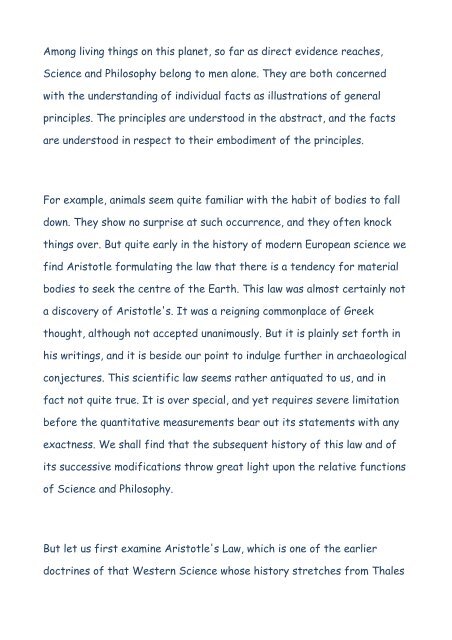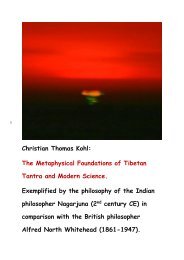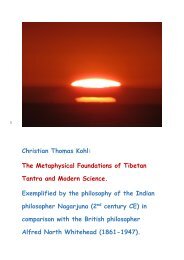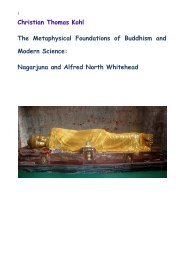Christian Thomas Kohl The Metaphysical Foundations of Buddhism and Modern Science
Christian Thomas Kohl The Metaphysical Foundations of Buddhism and Modern Science
Christian Thomas Kohl The Metaphysical Foundations of Buddhism and Modern Science
Create successful ePaper yourself
Turn your PDF publications into a flip-book with our unique Google optimized e-Paper software.
Among living things on this planet, so far as direct evidence reaches,<br />
<strong>Science</strong> <strong>and</strong> Philosophy belong to men alone. <strong>The</strong>y are both concerned<br />
with the underst<strong>and</strong>ing <strong>of</strong> individual facts as illustrations <strong>of</strong> general<br />
principles. <strong>The</strong> principles are understood in the abstract, <strong>and</strong> the facts<br />
are understood in respect to their embodiment <strong>of</strong> the principles.<br />
For example, animals seem quite familiar with the habit <strong>of</strong> bodies to fall<br />
down. <strong>The</strong>y show no surprise at such occurrence, <strong>and</strong> they <strong>of</strong>ten knock<br />
things over. But quite early in the history <strong>of</strong> modern European science we<br />
find Aristotle formulating the law that there is a tendency for material<br />
bodies to seek the centre <strong>of</strong> the Earth. This law was almost certainly not<br />
a discovery <strong>of</strong> Aristotle's. It was a reigning commonplace <strong>of</strong> Greek<br />
thought, although not accepted unanimously. But it is plainly set forth in<br />
his writings, <strong>and</strong> it is beside our point to indulge further in archaeological<br />
conjectures. This scientific law seems rather antiquated to us, <strong>and</strong> in<br />
fact not quite true. It is over special, <strong>and</strong> yet requires severe limitation<br />
before the quantitative measurements bear out its statements with any<br />
exactness. We shall find that the subsequent history <strong>of</strong> this law <strong>and</strong> <strong>of</strong><br />
its successive modifications throw great light upon the relative functions<br />
<strong>of</strong> <strong>Science</strong> <strong>and</strong> Philosophy.<br />
But let us first examine Aristotle's Law, which is one <strong>of</strong> the earlier<br />
doctrines <strong>of</strong> that Western <strong>Science</strong> whose history stretches from Thales


















